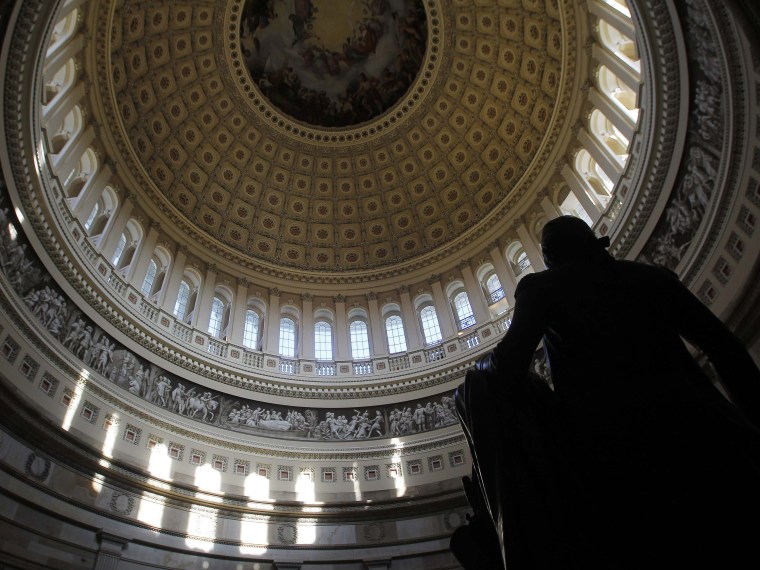Rep. Steve Cohen (D-Tenn.), seen as an on-the-fence Democrat on the international nuclear agreement with Iran, announced his support for the diplomatic deal this morning. His endorsement came on the heels of three Democratic senators announcing yesterday that they're backing the agreement, too.
Republican leaders seem resigned to the fact that they're probably going to lose this fight and the deal will likely be implemented, but the number of GOP lawmakers willing to support the deal still stands at zero.
But away from Capitol Hill, the picture changes. We
talked this week about some notable Republican figures who may not have a vote, but who nevertheless back the Iran agreement, including former Sen. Richard Lugar (R-Ind.), who served as chairman of the Senate Foreign Relations Committee, and Brent Scowcroft, a veteran National Security Advisor to several Republican presidents, who also served as the chairman of George W. Bush's Foreign Intelligence Advisory Board. A
reader reminded me that I neglected to mention former Sen. John Warner (R-Va.), a former chairman of the Senate Armed Services Committee, who's also
offered support for the deal.
"What we're really seeing here are the last vestiges of a Reagan/HWBush-era Republican Party that took foreign policy seriously on its merits."
He
added that Republicans like Scowcroft and Lugar are better labeled the GOP's "grown-ups."
That's true. It also raises a broader point about the slow disappearance of these "grown-ups" and their declining influence over Republican policymaking, especially in the area of international affairs.
It's been a long while since we last
talked about this, but long-time readers may recall that Jacob Heilbrunn wrote
an item several years ago in which he argued that we were witnessing the "twilight of the wise man" and "the last gasp" of the Republican foreign policy establishment.
That was in 2011. Two years later, the
American Prospect ran
a good piece from Jonathan Bernstein that's worth re-reading with the benefit of hindsight.
What is missing, specifically? The Republican side of "establishment" foreign policy. That is, a group of people who are certainly Republicans, but are not particularly partisan and who are comfortable working with the similar set of Democrats. Think Dick Lugar; think Colin Powell; think, perhaps more than anyone over the last 50 years, George H.W. Bush. Those Republicans, as Lugar's defeat for re-election last year demonstrated, have been driven to the fringes of their party (or perhaps out of it; Powell is still a Republican, but supported Barack Obama in 2008 and 2012). Why does that matter for Barack Obama? There just are not very many Republicans remaining who both care about foreign policy and national security and who are also inclined to work with a Democratic president as a matter of course. Those who do have virtually no clout within their party. Which means that when Obama proposes something, he starts with essentially the same zero Republican votes that he starts with on domestic-policy proposals.
In context, Bernstein was talking about U.S. policy towards Syria, but note how easily this identical argument can be applied today to the White House's nuclear deal, and U.S. policy towards Iran.
I
still believe the demise of the Republican foreign policy establishment was gradual, though the turning point came in late 2010, during the debate over ratification of the New START treaty.
The proposal not only had the enthusiastic backing of the international community, but it was also endorsed by Brent Scowcroft, James Baker, and Henry Kissinger -- members in good standing of the Republican Foreign Policy Elder Statesmen Club -- along with Reagan Secretary of State George Schultz, Reagan Chief of Staff Kenneth Duberstein, Reagan Chief of Staff Howard Baker, Colin Powell, and Condoleezza Rice. In all, six former secretaries of state and five former secretaries of defense from both parties; the chairman of the Joint Chiefs of Staff; seven former Strategic Command chiefs; National Security Advisers from both parties; and nearly all former commanders of U.S. nuclear forces
urged Senate Republicans to ratify the treaty.
New START eventually got the votes, but by a two-to-one margin,
Senate Republicans still voted against it. GOP senators heard from the party's establishment, and listened to the elder statesmen and women, but today's Republican lawmakers just didn't much care.
Two years later, in late 2012, the Senate tried to approve the U.N. Convention on the Rights of People with Disabilities. Former Senate Majority Leader Bob Dole (R-Kan.), a champion of the measure, made a rare appearance in the chamber just before the vote, pleading with GOP senators to be responsible.
They ignored him and GOP senators killed the measure.
Three of the Republicans who derailed the bipartisan measure are now running for president: Marco Rubio, Lindsey Graham, and Rand Paul.
The "twilight of the wise man," indeed.
As we
talked about a couple of years ago, there was a time when the Republican Party was considered the dominant domestic party on foreign policy, and there are probably some remnants of the population that still believe this. But the fact remains that today's GOP has no real foreign policy, no real foreign policy establishment, and no real foreign policy leaders with influence and credibility.
We'll be feeling the consequences of this for a long while.
